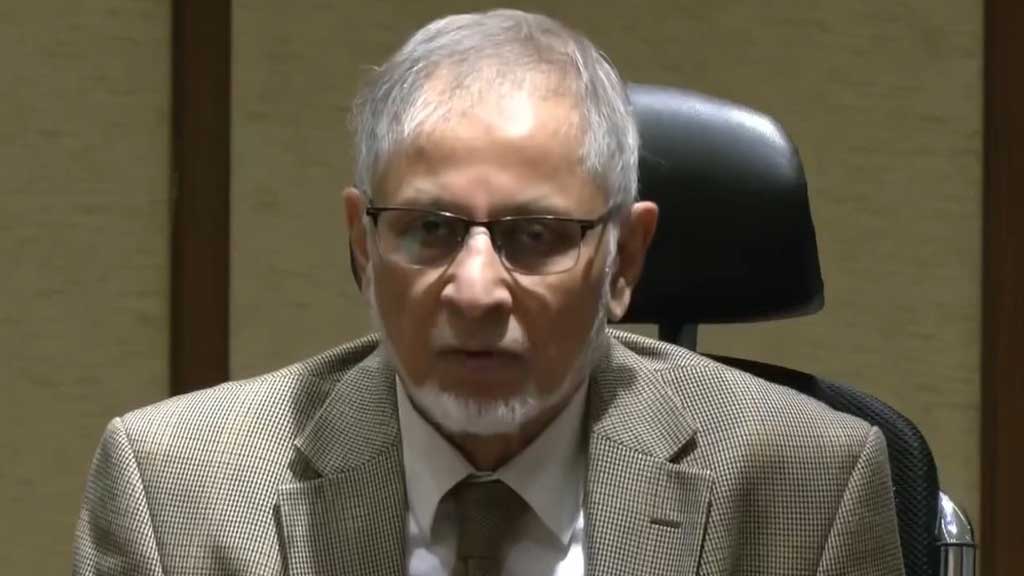News Flash
News Flash

By Mostak Ahmed
DHAKA, Sept 28, 2025 (BSS) - Dr. Anisuzzaman Chowdhury, Special Assistant to the Chief Adviser, today said that strict measures are being taken against those who have embezzled the funds of bank over the last 16 years as no one would be spared.
Dr Chowdhury made the remarks in an exclusive interview with the Bangladesh Sangbad Sangstha (BSS) at the Ministry of Finance at Bangladesh Secretariat today.
He said many of those who embezzled bank funds have already been arrested while the others are also under surveillance.
Referring to the arrest of former chairman of Janata Bank Abul Barkat, he said the loans granted during Barkat’s tenure at Janata Bank are under this government’s scrutiny.
“Every penny will be taken into account. Those who have committed large-scale financial crimes through irregularities and corruption won’t be spared,” he added.
Dr Chowdhury, responsible for overseeing the Ministry of Finance, said that it is not only Janata Bank but also all banks are under government’s scrutiny. “The nation will be informed in a timely manner about all developments,” he added.
Mentioning that the current interim government has been signing mutual legal assistance agreements with various countries regarding prevention of money laundering, Dr. Anisuzzaman Chowdhury said, “We’ll make such laws so that anyone attempting to launder money abroad from Bangladesh in the future will think ten times before as because none will be spared. They won’t be spared in any way.”
He added that a high-level committee, led by the Governor of Bangladesh Bank, is working to this end.
The Special Assistant said that all-out efforts would be made to recover whatever amount of money has been siphoned off abroad from Bangladesh over the past 16 years no matter in which country it has gone to.
“The thing is that we’ve to make separate agreements with each country. That is why it is taking some time,” he added.
He noted that laws differ from country to country like Switzerland, the UAE, Qatar, Singapore, the United States, Canada and the United Kingdom as each of those have different legal systems.
In some countries, he said once money is received, the authorities there have offered the money launderers citizenship or permanent residency. Because of this, bringing back those to Bangladesh who laundered money is becoming difficult. “Many countries, citing their own laws and regulations, naturally won’t wish to return laundered funds,” he added.
However, he said Bangladesh’s greatest asset at present is Chief Adviser Professor Dr. Muhammad Yunus. “He (Yunus) has very high international respect and dignity. When he requests assistance for Bangladesh internationally, no country can refuse. That is our big weapon,” he added.
He claimed that under the leadership of the Chief Adviser, the current government is on the verge of financial successes.
Dr. Anisuzzaman Chowdhury said that when a country undergoes through a revolution that eventually brings a changeover of power, that country’s GDP falls, unemployment rises and prices increase. “But, by the grace of Almighty Allah, that has not happened in our country,” he said.
He explained that followed by a revolution, the new government’s term tends to experience fall in GDP, rise in unemployment as well as decline in people’s purchasing power. Besides, poverty rate also increases side by side mortality rate increases while suicide rates also go up. “But, none of that has happened in Bangladesh. Our GDP didn’t go negative,” he added.
Acknowledging that the GDP growth has slowed somewhat, but he said that compared with other countries the rate of poverty here is much lower. “Our economic team has been successful. We’re one of the few countries that can loudly claim that even after an uprising our situation remains comparatively strong,” he said.
He said that reforms at the National Board of Revenue (NBR) were necessary because in most countries policy making and revenue collection are handled by two separate bodies, whereas in Bangladesh NBR used to perform both the roles. “That creates a conflict of interest. That is why NBR needed to be separated,” he pointed out.
Dr. Anisuzzaman Chowdhury termed the reforms at the NBR as epoch-making and very necessary.
On alleged corruption and bribery allegations against customs officials, he said these cannot be stopped by law alone. “Caution must be exercised in giving postings against various posts. At the same time, religious and moral issues must be brought to the attention of officials,” he said.
Mentioning that the financial-sector reforms are ongoing, he said, “Although it will take some time, but the reforms in the financial sector will soon be visible in Bangladesh.”
About the widespread concern that the prices of medicines would rise significantly when Bangladesh graduates from the Least Developed Country (LDC) status in 2026, the CA’s Special Assistant said that the impact would not be that much.
He explained that the medicines not produced in Bangladesh have little connection to LDC graduation.
He said about 85% of medicines produced domestically are generic while their patents have expired. “Even for medicines that are still under patent, in some cases we won’t face difficulties. For example, for a number of such medicines we’re manufacturing them here on behalf of the innovators or license holders. In other words, we’ve entered the global value chain. The world’s supply is coming from here,” he said.
Issuing a strong warning to the money launderers, renowned economist Dr Chowdhury said, “One important task is to make those sleepless who will launder money in the future. In the future, anyone who contemplates this kind of act will be forced to think before ten times. They won’t have the audacity anymore to launder money.”